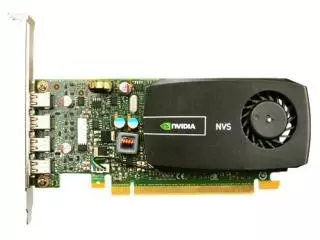HD Graphics 5300 vs NVS 510
If you are going to buy a new graphics card and are choosing between HD Graphics 5300 and NVS 510, there are a couple of things to consider. Cards with more VRAM in general perform better and allow you to play on higher graphics settings. Size also makes a difference. A model with a large heatsink can occupy up to three expansion slots on a motherboard. Be sure you have enough room in your PC case. When comparing GPUs with different architectures, more processing cores and even higher TFLOPS will not always translate to better performance. To help you decide which GPU you need, we have measured frame rates in a number of popular games. For more on how the HD Graphics 5300 stacks up against NVS 510, check out specs charts below.
HD Graphics 5300 is a Laptop Graphics Card
Note: HD Graphics 5300 is only used in laptop graphics. It has lower GPU clock speed compared to the desktop variant, which results in lower power consumption, but also 10-30% lower gaming performance. Check available laptop models with HD Graphics 5300 here:
Main Specs
HD Graphics 5300
NVS 510
Power consumption (TDP)
15 Watt
35 Watt
Interface
PCIe 2.0 x1
PCIe 2.0 x16
Supplementary power connectors
None
Memory type
System Shared
DDR3
Maximum RAM amount
2 GB
Display Connectors
No outputs
4x mini-DisplayPort
Check Price
Check Price
NVS 510 has 133% more power consumption, than HD Graphics 5300.
HD Graphics 5300 is connected by PCIe 2.0 x1, and NVS 510 uses PCIe 2.0 x16 interface.
HD Graphics 5300 is used in Laptops, and NVS 510 - in Desktops.
HD Graphics 5300 is build with Gen. 8 Broadwell architecture, and NVS 510 - with Kepler.
Core clock speed of NVS 510 is 697 MHz higher, than HD Graphics 5300.
HD Graphics 5300 is manufactured by 14 nm process technology, and NVS 510 - by 28 nm process technology.
Game benchmarks
Assassin's Creed Odyssey
Battlefield 5
Call of Duty: Warzone
Counter-Strike: Global Offensive
Cyberpunk 2077
Dota 2
Far Cry 5
Fortnite
Forza Horizon 4
Grand Theft Auto V
Metro Exodus
Minecraft
PLAYERUNKNOWN'S BATTLEGROUNDS
Red Dead Redemption 2
The Witcher 3: Wild Hunt
World of Tanks
high / 1080p
0−1
0−1
QHD / 1440p
0−1
0−1
low / 720p
0−1
1−2
medium / 1080p
0−1
0−1
QHD / 1440p
0−1
0−1
low / 720p
0−1
0−1
low / 768p
45−50
50−55
high / 1080p
35−40
45−50
QHD / 1440p
0−1
0−1
The average gaming FPS of NVS 510 in Call of Duty: Warzone is 19% more, than HD Graphics 5300.
low / 768p
60−65
60−65
medium / 768p
27−30
27−30
ultra / 1080p
10−11
7−8
high / 768p
21−24
16−18
The average gaming FPS of HD Graphics 5300 in Counter-Strike: Global Offensive is 10% more, than NVS 510.
low / 768p
85−90
70−75
ultra / 1080p
1−2
0−1
medium / 1080p
40−45
45−50
The average gaming FPS of HD Graphics 5300 in Cyberpunk 2077 is 8% more, than NVS 510.
low / 768p
50−55
45−50
medium / 768p
18−20
10−11
ultra / 1080p
0−1
0−1
The average gaming FPS of HD Graphics 5300 in Dota 2 is 20% more, than NVS 510.
high / 1080p
0−1
−
low / 720p
0−1
0−1
low / 720p
21−24
21−24
medium / 1080p
0−1
0−1
HD Graphics 5300 and NVS 510 have the same average FPS in Fortnite.
high / 1080p
0−1
0−1
QHD / 1440p
0−1
0−1
low / 720p
0−1
0−1
medium / 1080p
0−1
0−1
low / 768p
16−18
18−20
high / 1080p
0−1
0−1
QHD / 1440p
0−1
0−1
medium / 720p
10−11
12−14
The average gaming FPS of NVS 510 in Grand Theft Auto V is 23% more, than HD Graphics 5300.
low / 720p
0−1
0−1
low / 768p
80−85
75−80
high / 1080p
60−65
27−30
ultra / 1080p
45−50
−
medium / 1080p
75−80
−
The average gaming FPS of HD Graphics 5300 in Minecraft is 35% more, than NVS 510.
low / 720p
7−8
8−9
The average gaming FPS of NVS 510 in PLAYERUNKNOWN'S BATTLEGROUNDS is 14% more, than HD Graphics 5300.
low / 720p
0−1
0−1
low / 768p
0−1
0−1
low / 768p
45−50
45−50
medium / 768p
12−14
14−16
ultra / 1080p
5−6
0−1
high / 768p
9−10
12−14
The average gaming FPS of NVS 510 in World of Tanks is 8% more, than HD Graphics 5300.
Full Specs
HD Graphics 5300
NVS 510
Architecture
Gen. 8 Broadwell
Kepler
Code name
Broadwell GT2
GK107
Type
Laptop
Workstation
Release date
5 September 2014
23 October 2012
Pipelines
24
192
Core clock speed
100 MHz
797 MHz
Boost Clock
900 MHz
Transistor count
1,300 million
1,270 million
Manufacturing process technology
14 nm
28 nm
Texture fill rate
21.60
12.75
Floating-point performance
306.0 gflops
Length
160 mm
Memory bus width
64/128 Bit
128 Bit
Memory clock speed
1782 MHz
Memory bandwidth
28.51 GB/s
Shared memory
+
DirectX
12 (11_1)
12 (11_0)
Shader Model
5.1
5.1
OpenGL
4.4
4.6
OpenCL
2.0
1.2
Vulkan
1.1.80
1.1.126
CUDA
3.0
Bitcoin / BTC (SHA256)
17 Mh/s
Quick Sync
+
Check Price
Check Price

